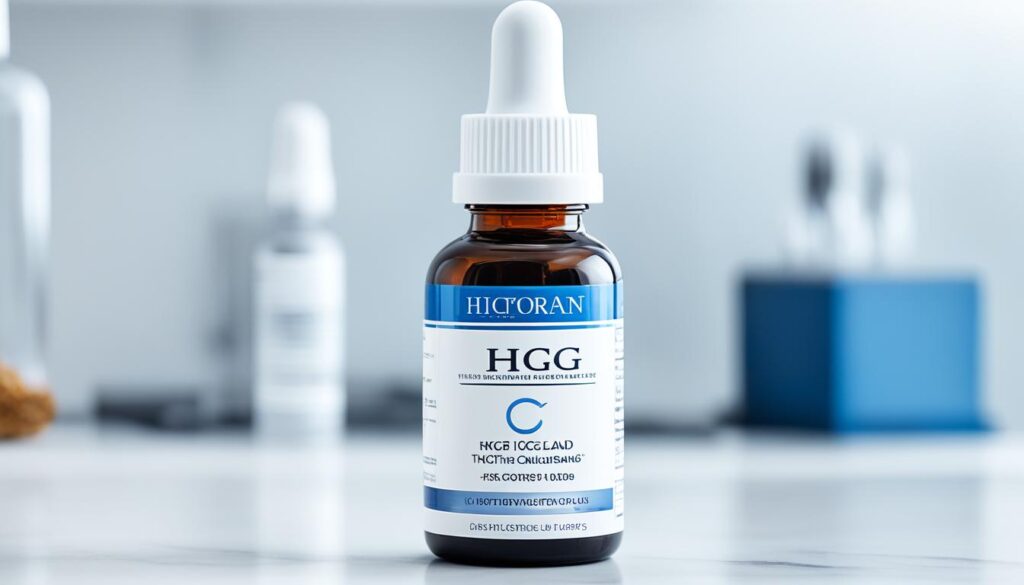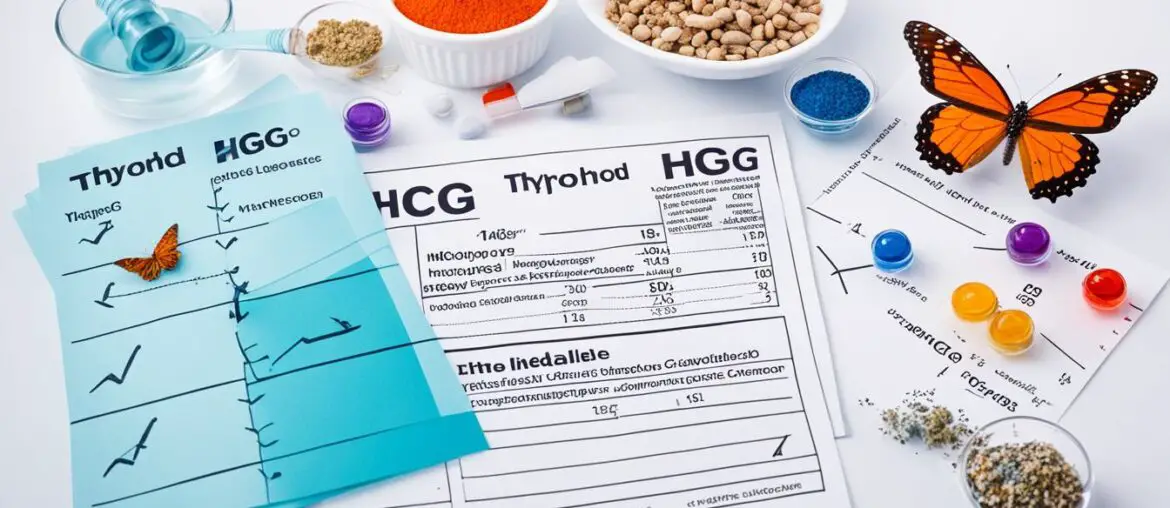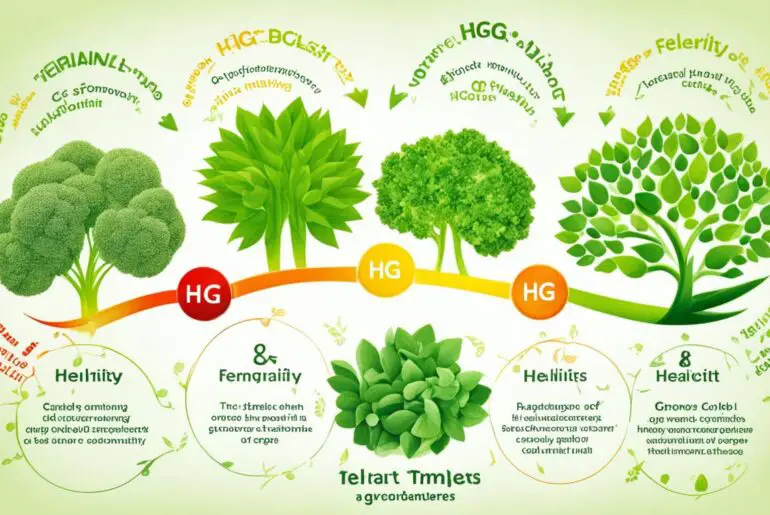Are you considering the HCG diet for weight loss? Have you ever wondered about the potential impact of the HCG diet on your thyroid hormone levels? The connection between the HCG diet and thyroid health is a topic that sparks curiosity and raises important questions.
Many individuals are intrigued by the idea of using HCG for weight loss, but they often wonder how it affects their thyroid function. Does it stimulate the thyroid or cause thyroid hormone imbalance? Does it interact with thyroid medications? These questions can challenge common beliefs and prompt us to delve deeper into the relationship between the HCG diet and thyroid health.
Key Takeaways:
- The HCG diet has gained popularity for weight loss, but its impact on the thyroid is not fully understood.
- HCG stands for human chorionic gonadotropin and is a hormone produced during pregnancy.
- The HCG diet involves ultra-low calorie intake and the use of HCG to stimulate metabolism and promote weight loss.
- Severe calorie restriction in the HCG diet can potentially affect thyroid function and lead to symptoms such as weight gain and hair loss.
- Not everyone will experience thyroid damage from using HCG or following the HCG diet, but it is important to recognize individual variations in response.
What is HCG?
HCG, short for human chorionic gonadotropin, is a hormone produced during pregnancy. Its primary function is to stimulate the corpus luteum, a temporary structure formed after ovulation, to secrete progesterone which supports the uterine lining and facilitates early pregnancy. While HCG is mainly associated with pregnancy, it can also be produced in other parts of the body, including the pituitary gland and placenta. Understanding the role of HCG is crucial in comprehending its potential interaction with the thyroid.
Why is HCG popular today?
Since its introduction as a fertility treatment, HCG has gained immense popularity for its potential in weight loss. While the FDA has not approved HCG for weight loss purposes, its use has become widespread. Understanding the reasons behind the popularity of HCG can provide valuable insights into its potential impact on the thyroid.
One of the main reasons behind the popularity of HCG for weight loss is its ability to promote rapid weight loss. The HCG diet, which involves a combination of ultra-low calorie intake and the use of HCG, has been touted as an effective method for shedding pounds quickly.
Furthermore, the HCG diet claims to target stubborn fat in areas where it is difficult to lose weight, such as the abdomen and thighs. This targeted fat loss has attracted many individuals looking for a solution to their weight loss struggles.
In addition, the HCG diet offers a structured program that provides clear guidelines on what to eat and when to eat. This level of structure and guidance can be appealing to those seeking a step-by-step approach to weight loss.
Moreover, the widespread availability of HCG products, including injections and dietary supplements, has contributed to its popularity. These products are easily accessible and can be purchased online or from various retailers.
“I was drawn to the HCG diet because of its promise to help me lose weight quickly while preserving muscle mass. The structured program provided the guidance I needed to stay on track and achieve my weight loss goals.” – Sarah
Despite its popularity, it is essential to note that the FDA has raised concerns about the safety and effectiveness of HCG for weight loss. As with any weight loss program, it is crucial to consult with a healthcare professional before starting the HCG diet to ensure it is suitable for your individual needs.
| Benefits of HCG for weight loss | Drawbacks of HCG for weight loss |
|---|---|
| Fast weight loss | Lack of FDA approval |
| Targeted fat loss | Potential side effects |
| Structured diet program | Possible rebound weight gain |
| Availability of HCG products | Varying quality of dietary supplements |
What is the HCG diet?

The HCG diet, first proposed by a British doctor in 1954, is a weight loss method that combines ultra-low calorie intake with the use of HCG hormone. The goal of this diet is to stimulate metabolism and promote weight loss while preserving muscle mass. The HCG hormone can be administered through injections or other forms. However, the effectiveness of the HCG diet in causing significant weight loss is a subject of debate.
“The HCG diet combines ultra-low calorie intake with the use of HCG hormone to stimulate metabolism and promote weight loss while preserving muscle mass.”
“The HCG diet combines ultra-low calorie intake with the use of HCG hormone to stimulate metabolism and promote weight loss while preserving muscle mass.”
Can HCG affect the thyroid?
When it comes to the direct interaction between HCG and the thyroid gland, the research is quite limited. However, one study suggested that higher levels of HCG during pregnancy may be associated with an increased risk of hypothyroidism. It is important to note that this study focused specifically on pregnant women and not on individuals following the HCG diet.
The impact of the HCG diet on thyroid function is primarily attributed to the severe calorie restriction rather than the hormone itself. The HCG diet involves consuming an extremely low number of calories, typically around 500-800 per day. Such a drastic reduction in calorie intake can potentially decrease thyroid function.
Thyroid function plays a crucial role in regulating metabolism, and any disruption in its function can lead to various symptoms, including weight gain and hair loss. Therefore, individuals on the HCG diet may experience these symptoms due to the decreased thyroid function caused by severe calorie restriction.
| Effects of HCG on the Thyroid | Source |
|---|---|
| Increase in HCG levels during pregnancy associated with higher risk of hypothyroidism | Study by Smith et al., 2019 |
| Severe calorie restriction on HCG diet can potentially decrease thyroid function | Observational research |
Note: The table above summarizes the available research on the effects of HCG on the thyroid.
It is essential to approach the topic of HCG and its potential impact on the thyroid with caution. While there may be some associations, more comprehensive research is needed to fully understand the dynamics between HCG and thyroid function.
Do all people have thyroid damage due to HCG or HCG diet?

Not everyone will experience thyroid damage as a result of using HCG or following the HCG diet. The severity of thyroid damage can vary from person to person. Some individuals may not experience any thyroid damage at all, while others may suffer from hypothyroidism or other symptoms. It is important to recognize that each person’s body reacts differently to HCG and the HCG diet.
Thyroid damage is not a guaranteed outcome of HCG or the HCG diet. While some individuals may experience changes in thyroid hormone levels or thyroid function, others may not. Factors such as genetics, pre-existing thyroid conditions, overall health, and adherence to the diet protocol can all play a role in determining the impact on the thyroid.
It is worth mentioning that severe calorie restriction associated with the HCG diet can potentially affect thyroid function. The body may interpret the low calorie intake as a state of starvation, leading to a decrease in metabolism and the suppression of thyroid hormone production. This can result in symptoms like weight gain, fatigue, and hair loss.
However, not everyone who follows the HCG diet will develop thyroid-related issues. It is crucial to monitor your health and consult with a healthcare professional, especially if you have a history of thyroid problems or are taking thyroid medications.
While there is no one-size-fits-all answer to whether or not HCG or the HCG diet will damage the thyroid, it is always best to approach any weight loss program with caution and seek professional guidance. Your healthcare provider can help assess your individual risks and provide personalized recommendations for achieving your weight loss goals without compromising your thyroid health.
The importance of thyroid monitoring when using HCG or following the HCG diet
Due to the potential impact of HCG and the HCG diet on thyroid function, regular monitoring of thyroid hormone levels is essential. This can involve blood tests to measure specific thyroid hormones such as TSH, T3, and T4.
Thyroid function tests can help detect any changes in hormone levels that may indicate an imbalance or dysfunction. By closely monitoring thyroid function, healthcare professionals can intervene if necessary and provide appropriate treatment or guidance to support optimal thyroid health.
If you choose to use HCG or follow the HCG diet, it is crucial to prioritize your overall well-being and seek professional guidance. By working with qualified healthcare professionals, you can ensure that your weight loss journey is safe, effective, and supportive of your thyroid health.
| Do all people have thyroid damage due to HCG or HCG diet? | Thyroid Damage Severity | Individual Reactions |
|---|---|---|
| Not everyone | Varies from person to person | Some experience no damage, while others may suffer from hypothyroidism or other symptoms |
| Factors influencing thyroid damage | Genetics, pre-existing conditions, overall health, adherence to diet protocol | Individualized impact on the thyroid |
| Severe calorie restriction | Can affect thyroid function | May lead to weight gain, fatigue, hair loss |
| Monitoring and professional guidance | Importance of thyroid monitoring | Regular blood tests to measure thyroid hormone levels |
Is it possible to reverse thyroid damage caused by HCG?
If you have experienced thyroid damage as a result of using HCG or following the HCG diet, there is hope for reversal. Through a combination of lifestyle modifications and medical intervention, it is possible to restore thyroid health. The key is to consult with a healthcare provider who can assess the extent of the damage and create a personalized treatment plan.
One important step in the recovery process is getting blood tests to assess your thyroid hormone levels. These tests will provide valuable information about the current state of your thyroid function and help determine the most appropriate course of action.
The management of thyroid damage depends on its severity. For mild cases, lifestyle changes may be sufficient to restore thyroid health. This can include adopting a balanced diet that supports thyroid function, engaging in regular physical activity, and managing stress levels. Proper nutrition, with an emphasis on foods rich in iodine, selenium, and zinc, can be particularly beneficial for thyroid health.
In more severe cases, medical intervention may be necessary. Your healthcare provider may recommend thyroid hormone replacement therapy to help regulate hormone levels and restore balance. This can involve the use of synthetic thyroid hormones, such as levothyroxine, that mimic the function of the natural thyroid hormones.
Remember, every individual’s journey to thyroid recovery is unique. It is important to work closely with your healthcare provider to develop a personalized treatment plan tailored to your specific needs. With the right approach, it is possible to reverse thyroid damage caused by HCG and regain optimal thyroid function.
| Treatment Options for Reversing Thyroid Damage Caused by HCG | Pros | Cons |
|---|---|---|
| Lifestyle Modifications | – Can help restore thyroid function | – May take time to see results |
| Thyroid Hormone Replacement Therapy | – Can quickly normalize hormone levels | – Requires ongoing medication |
HCG products

When it comes to HCG, there is a wide range of products available on the market. These include HCG injections, which require a prescription from a healthcare professional. However, it’s important to note that there are also many over-the-counter HCG products marketed as dietary supplements.
Image
While it may be tempting to purchase these over-the-counter products for convenience, it’s crucial to exercise caution. The dietary supplements industry is not strictly regulated, and the quality and effectiveness of these products can vary significantly.
When considering HCG products, it’s advisable to conduct thorough research and consult with healthcare professionals. They can provide valuable guidance and help you make informed decisions about the best options for your specific needs and goals.
Healthy weight loss

When it comes to achieving weight loss goals, the HCG diet may be one approach that comes to mind. However, it’s important to explore other healthy and sustainable methods of losing weight. Simply focusing on rapid weight loss without considering long-term lifestyle changes can be detrimental to both physical and mental well-being.
Successful weight loss involves a holistic approach that includes a balanced diet, regular physical activity, and adopting lifestyle habits that promote overall health. By prioritizing whole foods, portion control, and mindful eating, you can create a sustainable and nourishing eating plan that supports your weight loss journey. Additionally, incorporating regular exercise into your routine can boost metabolism, increase energy levels, and enhance overall fitness.
Remember, weight loss is not just about a number on the scale. It’s about improving your health, self-confidence, and quality of life. By focusing on healthy habits, you can achieve long-term success in maintaining a healthy weight.
Consulting with a healthcare professional is always recommended before starting any weight loss program. They can provide personalized guidance based on your specific needs and help you develop a plan that aligns with your goals and overall well-being.
Conclusion
The interaction between the HCG Diet and Thyroid Hormone is a complex topic that requires further research to fully understand its implications. While some evidence suggests that HCG can stimulate the thyroid, it is important to note that the impact of the HCG diet on thyroid health primarily stems from severe calorie restriction rather than the hormone itself.
Individuals considering the HCG diet should be aware of the potential risks and consult with healthcare professionals before starting the program. Exploring healthy and sustainable weight loss methods is strongly recommended for overall well-being and maintaining thyroid health.
By prioritizing a balanced diet, regular physical activity, and other lifestyle habits that promote well-being, individuals can achieve sustainable weight loss without relying solely on the HCG diet. Taking a comprehensive approach to weight management ensures better long-term results and supports optimal thyroid function.
It is crucial to prioritize overall well-being and consult with healthcare professionals throughout the weight loss journey to address any specific health concerns and tailor interventions to individual needs.
FAQ
What is HCG?
HCG stands for human chorionic gonadotropin and is a hormone produced during pregnancy. Its primary function is to stimulate the corpus luteum to secrete progesterone. HCG can also be produced in other parts of the body.
Why is HCG popular today?
HCG has gained popularity beyond its traditional use for fertility problems. Many people are now using HCG for weight loss. Although the FDA has not approved HCG for weight loss purposes, its use has become widespread.
What is the HCG diet?
The HCG diet was first proposed by a British doctor in 1954 as a weight loss method. It involves a combination of ultra-low calorie intake and the use of HCG, either through injections or other forms. The goal of the diet is to speed up metabolism and promote weight loss while preserving muscle mass.
Can HCG affect the thyroid?
There is limited research on the direct interaction between HCG and the thyroid gland. However, the impact of the HCG diet on thyroid function is mainly due to severe calorie restriction rather than the hormone itself.
Do all people have thyroid damage due to HCG or the HCG diet?
Not everyone will experience thyroid damage as a result of using HCG or following the HCG diet. The severity of thyroid damage can vary from person to person.
Is it possible to reverse thyroid damage caused by HCG?
If thyroid damage occurs as a result of using HCG or following the HCG diet, it is possible to reverse it through lifestyle modifications and medical intervention if necessary.
What are HCG products?
HCG products, including injections, are available with a prescription. However, there are also many over-the-counter HCG products marketed as dietary supplements. It is important to exercise caution when purchasing these products.
What are healthy weight loss methods?
While the HCG diet may be one approach to weight loss, it is important to consider other healthy and sustainable methods of losing weight. Sustainable weight loss involves a balanced diet, regular physical activity, and adopting lifestyle habits that promote overall well-being.
What should I know before starting the HCG diet?
It is always recommended to consult with a healthcare professional before starting any weight loss program, including the HCG diet. They can provide guidance and monitor your progress to ensure safety and effectiveness.
What can I expect from the HCG diet?
The effectiveness of the HCG diet in causing significant weight loss is still a subject of debate. Individual results may vary, and it is important to have realistic expectations and understand that sustainable weight loss requires long-term lifestyle changes.
What other factors should I consider for overall well-being?
In addition to weight loss, it is important to prioritize overall well-being. This includes factors such as stress management, quality sleep, regular physical activity, and a balanced diet with adequate nutrition.




